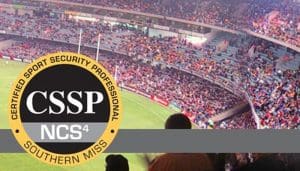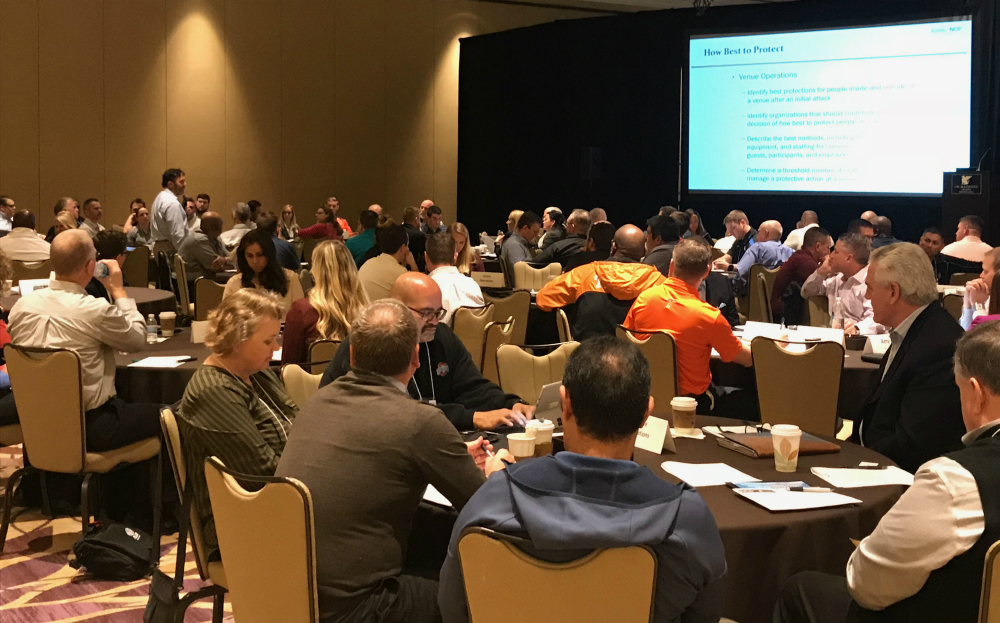The National Center for Spectator Sports Safety and Security, or NCS4, is a leading research and education organization focused on threats and safety issues related to sports venues.
NCS4 works with private companies, associations, universities and government agencies to provide information, training and tools to officials responsible for managing sporting events and responding to emergencies.
As such, the center can be a great resource for sports venue managers, event managers, first responders and others by offering services ranging from professional development training to academic programs and conferences.
“The best practices we’re gathering are very important for the country,” NCS4 Director Lou Marciani says. “It gives us current data for our curriculums and makes our content extremely current. Our focus is on training, and we’re hearing from the best of the best.”
Campus Safety recently attended NCS4’s National Intercollegiate Athletics Safety and Security Summit in Orlando to learn more about NCS4 and how it’s helping school officials host safe events around the country.
NCS4’s History
NCS4 was established by the University of Southern Mississippi, or USM, in 2006 after researchers at the school began looking into security at sports stadiums in hopes of establishing standards for venue management and security.
Sports venues had been deemed critical infrastructure by the federal government following the Sept. 11 attacks five years earlier, and USM received a grant from the Department of Homeland Security to train event managers at colleges shortly after forming the center.
NCS4’s relationship with government agencies including DHS, the FBI and the secret service has remained strong since then.
“We’re very active with the government on things like providing training and monitoring incidents so we can keep abreast with current events,” Marciani explains.
Since its founding, NCS4 has also collaborated with professional and collegiate sports leagues, marathon and endurance event organizers, international sporting associations, private sector firms and more.
The center has used these partnerships to bring together experts to facilitate information sharing across the sport venue management industry.
“Creating these partnerships at conferences is important because in real life there’s so much collaboration,” Marciani says. “All you do in this industry is collaborate. That’s why we set up these workshops and trainings, to spark discussion about strategies and best practices and things like that.”

Lou Marciani is the director of NCS4.
Today NCS4 is the country’s only research center devoted to the study and practice of spectator sports security. Each year, NCS4 releases updated versions of best practice guides to help event managers in every major industry.
NCS4 Conferences
NCS4 hosts a number of events each year for different industries. Specific NCS4 conferences include:
- The National Marathon Safety and Security Summit
- The National Intercollegiate Athletics Safety and Security Summit
- The Commercial Sport and Entertainment Facilities Safety and Security Summit
- The National Interscholastic Athletics Safety and Security Summit
- The National Sports Safety and Security Summit
The annual National Sports Safety and Security Summit is the center’s largest event (it will be held in July this year in Louisville, Kentucky).
Marciani says the conferences give people the opportunity to get information on the latest threats and lessons learned in the industry.
“Recent attacks greatly impact our events,” Marciani says. “As things come up it’s great to have these people come together to discuss recent incidents. As an example, you saw vehicle ramming threats covered [at the intercollegiate conference] today. These discussions are a way to stay up to date on best practices.”
To learn more about NCS4 conferences, check out their events page.
NCS4 Training Programs
Officials running events at every level, from high schools to international athletic associations, can find useful training resources from NCS4. Marciani sees training as the core service of NCS4.
“NCS4 makes its mark with training, that’s our real focus, is human capital development,” Marciani says. “From supervisors all the way up to directors, we’re looking at what competencies are necessary for them to continue to grow and improve at their jobs.”
In cooperation with Texas A&M’s Texas Engineering Extension Service’s National Emergency Response and Rescue Training Center (TEEX/NERRTC), NCS4 offers the following DHS and FEMA approved training workshops:
- Sport Event Risk Management. This scenario-based training curriculum focuses on building capabilities for multi-agency collaboration.
- Sport and Special Event Incident Management. This 16-hour course aims to develop athletic department staffs, facility management personnel, campus public safety personnel, emergency response supervisors, and others involved in sports and special event management.

- Sport and Special Event Enhanced Incident Management. This 24-hour course prepares emergency responders as well as event management personnel, concessionaries, athletic department personnel and elected and chief executives who would be involved in the preparation for and response to a large-scale incident during sporting or special events.
- Sport Event Evacuation Training and Exercise. This course teaches sport venue managers to prepare and/or enhance evacuation planning capabilities to assist emergency responders.
NCS4 also offers a number of certifications, including the Certified Sport Security Professional (CSSP) certification and the Certified Sport Venue Staff (CSVS) certification. These certifications have created standardized competencies in an industry where people come from a wide range of backgrounds and training levels.
Last year, NCS4 announced a partnership with the International Criminal Police Organization (INTERPOL) to create several training initiatives including a curriculum for law enforcement officials in the 190 INTERPOL member countries that host major international sporting events.
NCS4 Continues to Evolve

Marciani says NCS4 was awarded $3 million in grants during the most recent Congressional session and plans to expand its training operations.
“We already do the accreditations and certifications, but I think more continuous learning initiatives are our primary goals,” Marciani says. “That will be our core growth segment going forward.”
Marciani also says NCS4 is in the early stages of creating a risk assessment tool that could be used by event management personnel.
“The goal with that is if I’m running a big parade or hosting a football game or something, I can have a self-assessment tool that could be a critical resource,” Marciani explains.
The team behind NCS4 is always looking to improve it’s support structures, and today the center’s myriad offerings are unrecognizable compared to its humble research beginnings.
People in the event security space can take advantage of those offerings to ensure they’re prepared if a crisis strikes.







